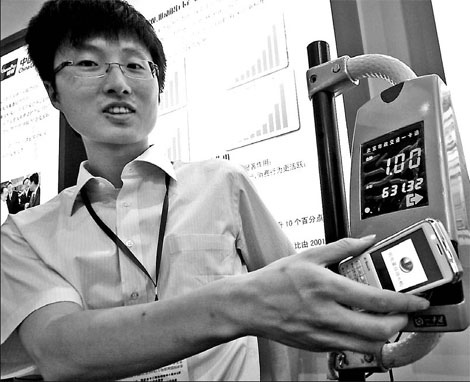Smart cards set for a boom
|
Consumers can use smart cards to pay bank bills, public transportation tickets, food expenses and more. The card can also be embedded into a cell phone SIM card or even in a pen. Nan Shan / For China Daily |
Industry expects to reach 20.6 billion yuan in sales next year
HONG KONG - Got a new credit card but no place to keep it because there are too many cards in your pocket already? Well, one smart card may replace all of your cards in the near future.
With the smart card, consumers can pay bank bills, public transportation tickets, food expenses and more. The card can also be embedded into a cell phone SIM card or even in a pen.
China has put a lot of emphasis on cutting-edge technology. The country's top technology regulator, the Ministry of Industry and Information Technology (MIIT), said that China is the biggest smart-card market globally and aims to have 10 billion smart cards in use in the near future.
"In the future, Chinese people will be able to use a single card to do almost everything, from voice calls to meal purchases," Zhang Qi, general director of the electronics and IT products department at MIIT, said on March 30 at the region's biggest smart-card expo, Cartes in Asia 2011.
The technology behind all this is called Radio Frequency Identification (RFID), which is a wireless automatic-recognition technology that can connect to almost everything and makes counterfeiting difficult.
China launched a nationwide government smart-card project named Golden Card in 1993. After more than 1 billion first-generation ID cards were exchanged for chip-based second-generation ID cards, the country became the largest smart-card market worldwide.
In 2009, China was already ranked third in the RFID industry with a turnover of 8.51 billion yuan ($1.3 billion), behind the United Kingdom and the United States.
According to the data from MIIT, the smart-card industry expects to reach 20.6 billion yuan in sales next year.
"France was the first country to launch smart cards about 20 years ago, but China is the biggest market now with the fastest rate of growth," said Michael Weatherseed, director of the security business unit at Milipol Cartes and IDentification Expo, the world's biggest smart card expo.
He said that although China wasn't among the first countries to develop smart-card technology, Weatherseed forecast a 30 percent year-on-year industry growth rate in the country - much faster than Europe and the US - because of its huge population and government support.
According to the US-based research company Frost & Sullivan, about 70 percent of smart cards are applied to the telecommunication industry. "China has more than 800 million telecom subscribers and is a huge potential market for smart SIM cards", said Jin Dongbin, chief engineer of China Telecommunication Corp.
Beijing-based Watchdata Technologies Ltd, the official partner of China's three telecommunication carriers, has provided more than 3 million smart SIM cards called "SIMpass". Users can use the SIM card to make small payments or buy public transportation tickets and daily essentials by simply sweeping their phones across a sensor at the register.
"Our aim is to have 10 million users by the middle of 2012," said Gao Xiang, senior vice-president of Watchdata.
According to Frost & Sullivan, the mobile-payment market will reach 188.4 billion yuan in 2012 with 125 million users. "SIM application is the first step. After that, China will further develop RFID technology and sensor applications very soon," said Zhang Qi.
Financial and banking services are another field for the smart-card industry to develop. China's central bank, the People's Bank of China (PBOC), announced that the nation will replace all 2.3 billion magnetic-stripe bank cards with chip-based cards by the end of 2015.
Gemalto NV, a France-based smart-card maker and partner of PBOC, told China Daily that China is still in an adoption period and after the tipping point, multi-application smart cards will enter a boom phase in the country. The company makes more than 40 percent of the world's chip-based banking cards.
"Chip-based bank cards will be much safer than magnetic-stripe ones," said Suzanne Tong-Li, senior vice-president of Gemalto's secure transaction business in Asia. She told China Daily that after chip-based credit cards were issued in Malaysia at the end of 2004, the fraud rate dropped 43.2 percent in the first half of 2005 compared with the previous year.
"In order for multifunction smart cards to become a reality, cooperation between many industry sectors is required, which is not an easy thing," said Hover Xiao, a senior analyst at the market research company International Data Corp. "It is easier for bank cards to adopt the technology, but it will take time to add more functions to cell phone SIM cards," he said.
China Daily
(China Daily 04/08/2011 page16)



















